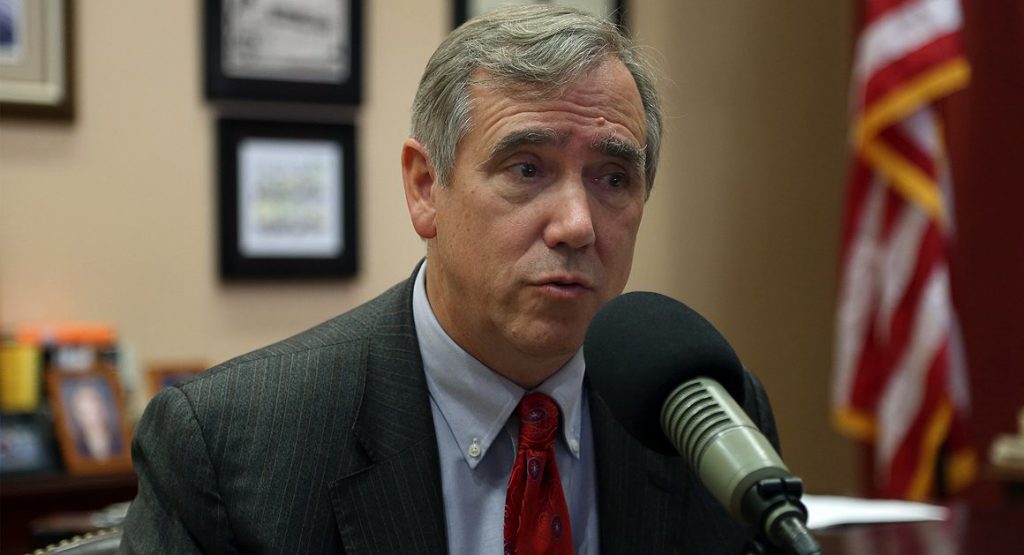The new crypto ban bill that was just introduced by twenty Senate Democrats aims to restrict cryptocurrency endorsements among top government officials and their families. This legislative effort, officially named the “End Crypto Corruption Act of 2025,” was put forward on May 7 amid growing scrutiny over potential conflicts of interest at the highest levels of US government, particularly involving President Trump and also Elon Musk.
Also Read: Dogecoin: What Would Elon Musk’s 2021 Mother’s Day Gift Be Worth Today?
Crypto Endorsement Bans, Influencer Risks, and Senate Crackdown


Key Provisions of the New Crypto Ban Bill
The proposed crypto regulation bill, led by Senators Jeff Merkley and Chuck Schumer, targets a range of senior officials such as the president, vice president, members of Congress, and executive appointees. The bill extends these restrictions to their spouses and dependent children as well, covering their terms in office and also an additional year after they leave their positions.
Senator Jeff Merkley stated:
“Currently, people who wish to cultivate influence with the president can enrich him personally by buying cryptocurrency he owns or controls. This is a profoundly corrupt scheme. It endangers our national security and erodes public trust in government.”
People found in violation of this new crypto ban bill could suffer severe penalties ranging from penalties or even sent to jail. However, currently, the bill still permits officials and their families to carry out normal sales business. The enactment of this legislation is a reaction to increased limelight surrounding possible proceeds of memecoin transactions between President Trump and his wife.
Trump-Musk Connections Under Crypto Influencer Ban
The current discussion is the appointment of Elon Musk as a special employee to the government in DOGE. To counter speculation, Musk has made clear that DOGE has no plans to make use of the Shiba Inu-themed memecoin into the future.
Also Read: Meta Leak: Zuckerberg’s Secret Crypto Plan Goes Public
The new crypto ban bill creates uncertainty about whether President Trump’s position as “chief crypto advocate” for World Liberty Financial would fall under the scope of this crypto influencer ban. This firm, reportedly associated with his sons and other officials, promotes digital assets, including WLD1 stablecoins.
Senate Democratic Leader Chuck Schumer said:
“Our democracy shouldn’t be for sale.”
Senate Democrats have voiced serious concerns about a reported $2 billion transaction involving WLD1 between crypto exchange Binance and an Abu Dhabi-based investment firm. These developments have amplified calls for a stricter US crypto crackdown on cryptocurrency-related activities by government personnel.
Stablecoin Legislation Stalls Amid New Crypto Ban Bill
The introduction of the crypto endorsement ban occurs amidst wider debates on digital asset policy in Washington. A separate legislative effort, known as the “GENIUS Act,” failed to pass a procedural vote in the Senate on May 8.
Senator Mark Kelly, who supported the new crypto ban bill, stated:
“Trump is cashing in on his presidency and making millions from his own crypto coins—this is corruption in broad daylight. I’m supporting this bill to make it illegal for the President and other government officials to make a profit from crypto assets.”
Notwithstanding the extensive support from both political parties and an attempt to add in amendments of anti-money laundering nature, the stablecoin bill failed to garner sufficient votes to advance on the Senate floor. Scott Bessent, the Treasury Secretary, called the failure of the vote a ‘missed opportunity’ to increase the US supremacy as digital assets are concerned.
For stablecoins and other digital assets to thrive globally, the world needs American leadership.
— Treasury Secretary Scott Bessent (@SecScottBessent) May 8, 2025
The Senate missed an opportunity to provide that leadership today by failing to advance the GENIUS Act.
This bill represents a once-in-a-generation opportunity to expand dollar…
Also Read: BlackRock Confirms XRP ETF Talks as Trader Places $6M Bet Amid $3 Target
Senator Lisa Blunt Rochester, who actually withdrew her support for the GENIUS Act, explained:
“I also remain concerned about the ongoing self-dealing and financial conflicts of interest being carried out by the Trump family.”
Though the crypto regulation bill is progressing, stablecoin legislation has been lagging behind and this has left the aggregate digital asset regulation landscape uncoordinated. The crypto influencer ban targets conflicts of interest as the US already conducts a wider anti-crypto nation-wide sweep.





